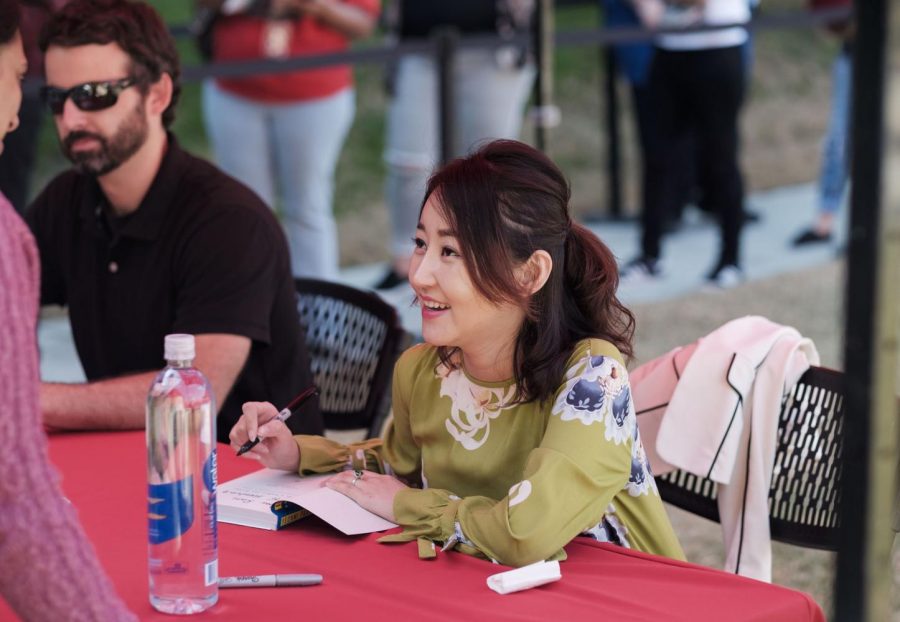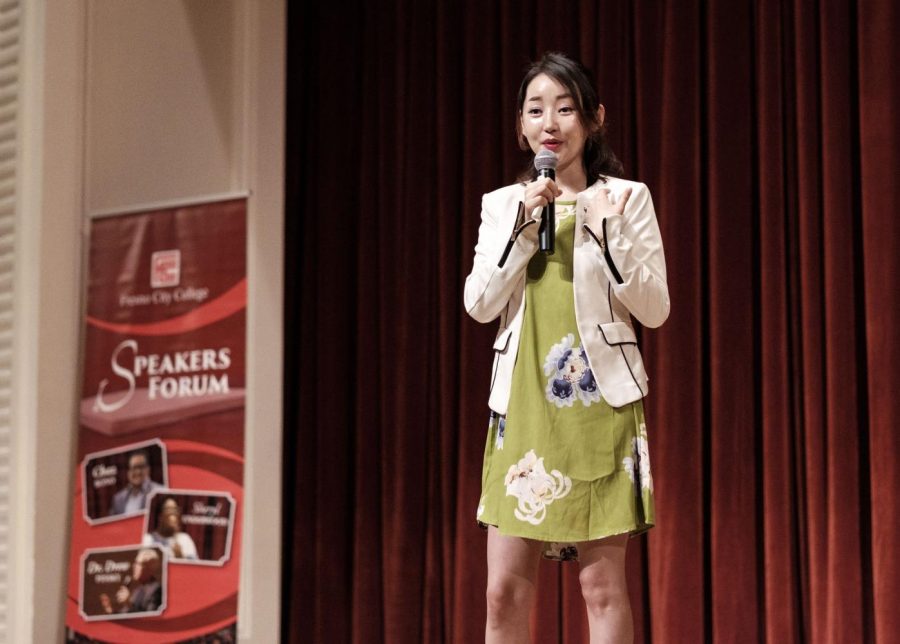Yeonmi Park Details her Life and Escape from North Korea
October 20, 2017
Yeonmi Park details her experience growing up as a child in North Korea during her talk for Fresno City College’s Speakers Forum series in the OAB auditorium on Thursday, Oct. 19, 2017.
North Korean defector and human rights activist Yeomni Park spoke about her life growing up in North Korea and brought awareness about the inhumane conditions within North Korea as part of Fresno City College’s Speakers Forum on Oct. 19.
Park escaped North Korea in 2007 when she was only 13, traveling through China and then crossing the Gobi Desert into Mongolia, until finally settling in South Korea in 2009.
Park, now 24, tours the country to tell people about her story and how life is within the North Korean regime in hopes of raising awareness.
With U.S.-North Korea relations becoming more strained after President Trump’s comments after North Korea’s numerous missile tests, Park was not there to warn about how dangerous Kim Jong Un is, but about how his people are living under his regime.
“[I’m not here] to talk about the weapon Kim Jong Un has,” Park said. “I’m here to talk about how the people live there, [people] like us, right now in this moment.”
Park drew the contrast of North Korea’s technological stagnation with the rest of the world’s advancements. Even constant 24 hour electricity is unheard of within North Korea. The country is the darkest area on Earth as seen from satellite photos, and Park joked that Earth Day was everyday in North Korea.
She described her time trying to watch a pirated copy of “Titanic” and how it took her months to watch because the power would only be on for a short while once a month, and she could only watch bits and pieces at a time.
For Park, the romance in the movie was a revelation. She could not comprehend the concept of love for other people as they were only taught to love the regime— to love the Dear Leader.
“We don’t have love songs in North Korea,” Park said. “You cannot hold your lover’s hand. We don’t even have the vocabulary for love. How can a person value something other than the regime?”
Park detailed her childhood growing up in the North Korean countryside, including her experience during the North Korean famine from 1994 to 1998. Deaths are estimated at 300,000 to 3.5 million.
“It was routine life for me to see dead bodies on the streets, seeing dying neighbors, dying friends.” Park said.
Despite seeing this, Park said she never learned compassion. She compared it to feeling joy when she saw electricity, clapping and cheering at the rare sight, but she felt nothing for the dead bodies.
“How can you be surprised by routine things? Seeing those dead bodies were so routine that I didn’t feel anything,” Park said.
She and her mother made the trek across China safely but fell into the hands of human traffickers in China, where she saw her mother raped. They were sold afterwards so they could stay in China.
“I lost my faith in humanity,” Park said. “I could not trust a human being again, especially men.”
Park said China is a critical piece in thinking about the North Korean issue that is often overlooked. North Korean refugees under the 1951 Refugee Convention, which China is bound to, are considered political refugees and cannot be forcibly returned to their country of origin.
“China does not follow this law. They catch us,” Park said. “It’s like slave hunters back in America. In China right now, if you catch a North Korean defector and turn them in, you get the money.”
Park explains that without China’s withdrawal of support of North Korea, there is no hope in any progress with their situation. She said it’s just politically safe to just blame the looming trouble.
“We cannot challenge China because they’re so powerful. All the businesses have [ties] to them. No politician is going to challenge them.”
Park explained that once she escaped North Korea, she had a hard time grasping how differently people thought outside of the influence of the North Korean regime.
“The biggest thing for me when I escaped from North Korea, it was not learning about the internet or learning to use credit cards or how to take a taxi. It was not all that. It was about thinking,” she said. “Critical thinking. I never learned that.”
Park said people often ask her about how North Koreans could possibly believe that Kim Jong Un was a god and how they could be so “brainwashed.” People told her how they thought North Koreans should just rise up against the regime.
“If you don’t know you’re a slave, if you don’t know what’s out there, how can you fight for it?” Park said. “People don’t know that life could be like this.”
Park took questions at the end of her talk. One of the questions was her opinion on President Trump’s tweets directed at Kim Jong Un.
“At least with North Korea he has the right approach. He says he’s going to try and convince China to join us and solve this problem,” Park said. “But where I disagree with him is that he doesn’t really have a policy and he doesn’t have any plans. It’s very disappointing.”
When asked how she thinks the North Korean crisis can be solved, she said at this point it’s bringing awareness about the human rights violations.
“Most people know that North Korea has a crazy weapon and a crazy dictator with a funny haircut, and that’s all we know,” Park said. “I think we have to talk about it, we have to raise awareness. To this day, we learn about the Holocaust so we can make sure that this doesn’t happen again. But that is happening in North Korea.”

After her talk, Park held a book signing in the OAB west courtyard for her 2015 memoir, “In Order to Live: A North Korean Girl’s Journey to Freedom.”
